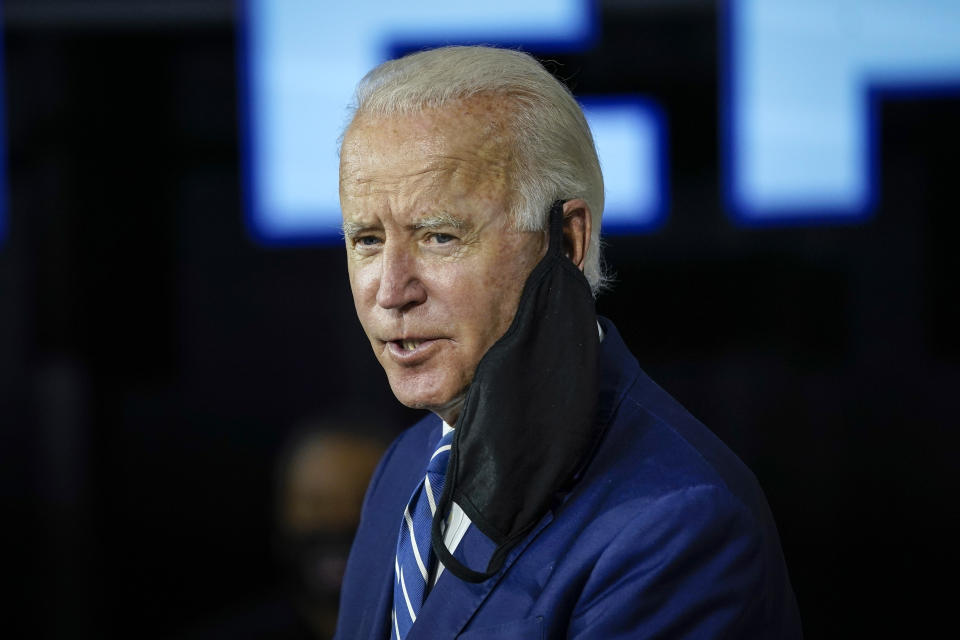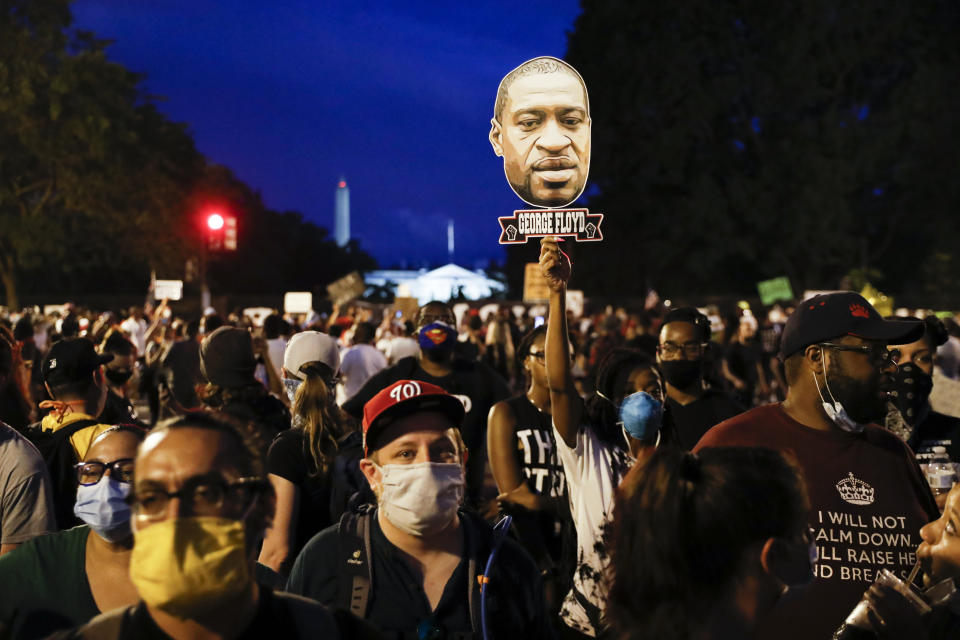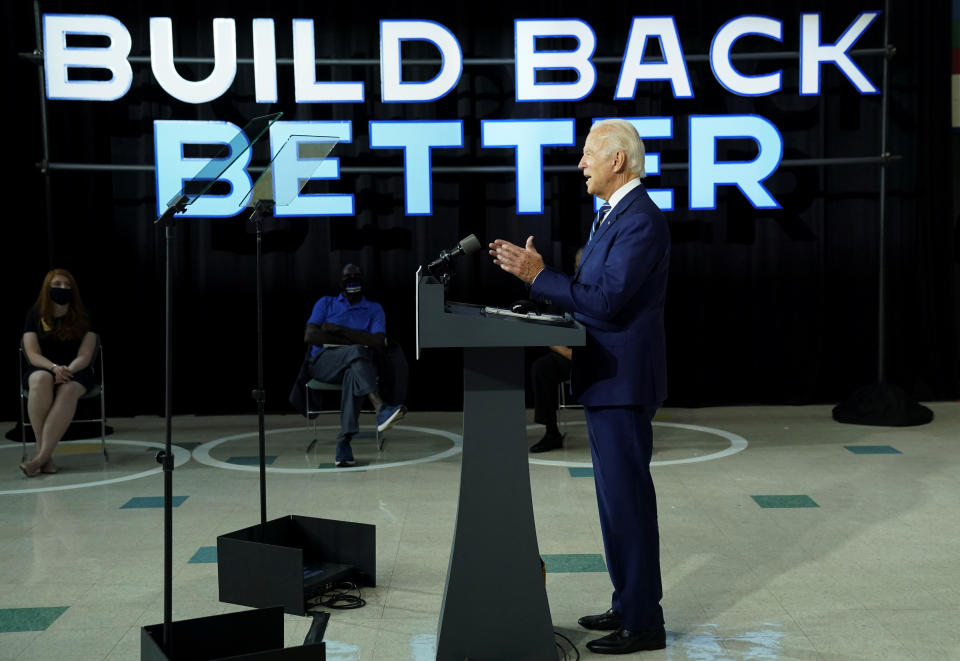Don't expect Joe Biden to weigh in on 'cancel culture'
- Oops!Something went wrong.Please try again later.
WASHINGTON — Don’t expect any Sister Souljah moments from Joe Biden regarding “cancel culture.” In 1992, Bill Clinton signaled independence from his party’s own base voters by rebuking Sister Souljah, a Black rapper and activist, in front of a majority Black audience at a meeting of Jesse Jackson’s Rainbow Coalition. After the Los Angeles riots that year, Souljah was quoted as saying that “if Black people kill Black people every day, why not have a week and kill white people?”
Clinton’s denunciation of the rapper caught Jackson and his audience by surprise. It also birthed the phrase “Sister Souljah moment” in the political lexicon.
The phrase is understood as indicating when a politician challenges his or her own supporters. Clinton’s move was widely interpreted as savvy political positioning, a signal that he would not be overly constrained by any portion of his base, particularly on divisive cultural issues. It was a nod to centrism at a time when political polarization was still a rising tide and not the nation’s entire weather system.
It was also a potential sign to some Southern whites that Clinton would not give Blacks too much political power, even if African-Americans represented one of the most loyal voting blocs for Democrats. Clinton is the most recent Democratic president to have won Georgia, Louisiana, Tennessee and Kentucky, in addition to his home state of Arkansas.

It is a different time now. President Trump has tried in recent weeks to make “cancel culture” a campaign issue. It’s part of a larger effort by Trump to convince Americans that Biden is too far left and too dangerous for the presidency.
But Biden has declined to respond to the president’s accusations that progressives are acting like a mob “driving people from their jobs, shaming dissenters and demanding total submission from anyone who disagrees.”
Even as a debate rages among journalists and intellectuals about whether cancel culture threatens free speech and thought — or if it even really exists — Biden is unlikely to weigh in on the topic, for a few reasons.
He doesn’t really need to show independence from the left, because most Americans know him already as a fairly moderate, well-established political figure. Unlike Clinton in 1992, Biden has little incentive to weigh in on a cultural fault line, especially as polls show him with a healthy lead against Trump both nationally and in key swing states.
There are other differences between Biden in 2020 and Clinton in 1992 as well.
Clinton’s main goal in defying his own party was to rebuild trust in his leadership, which had been damaged by controversies over extramarital affairs and revelations that he had avoided the draft during the Vietnam War.
“The trust level for Clinton was very low,” said Stan Greenberg, a Democratic pollster who was a close Clinton adviser in 1992 and remains active in national political polling now.

“It was very important for Clinton to establish that he was willing to stand up to forces in his own party … to change the party, but also that he had strength and authenticity, that he was taking positions not just because it was politically expedient but because he believed in them,” Greenberg told Yahoo News.
Greenberg said that Clinton was “very uncomfortable” about the confrontation with Jackson and that Clinton’s advisers “had a 24-hour watch to keep him from calling up Jackson and apologizing.”
Biden doesn’t face similar questions about his authenticity, but he does still have some work to do to win over the most left-wing voters in his party. He has moved left on some policy issues in recognition of that, such as health care, climate change and student debt. Unlike Clinton, who was in a rush to win over moderates, Biden arguably finds it more pressing to keep his left flank in line.
However, Biden has done things to make it harder for Trump to portray him as being captured by the most hard left elements in the Democratic Party. Biden said he rejected “defunding the police,” which became a popular slogan among protesters in the streets after George Floyd’s death on Memorial Day. But he said he does support redirecting some police funding away from confrontational or militarized responses to community needs, which is a key plank of what many activists mean when they refer to defunding the police.

Another reason Biden likely won’t be making any dramatic forays into the debate on cancel culture is that it’s harder to be a centrist now, because the country’s politics don’t reward it. More of the most loyal voters in both parties want harder, blunter tactics against the other side.
Black Americans also have become an even more crucial voting bloc for the Democratic Party over the past 30 years, and liberals have learned the hard way that African-American support can be taken for granted. The mass protests in the wake of Floyd’s killing were an indicator that societal attitudes about race have become more progressive. Polling shows there is now widespread agreement that systemic racism is a real problem.
The debate over cancel culture overlaps with issues of race. Those who say the concern is overblown argue that “social justice advocates see themselves as vindicating the rights to free expression for marginalized people who have traditionally been limited in their ability to express themselves.” On the other side, those who say cancel culture is a problem argue that public debate is being disfigured by attempts to intimidate, silence and punish ideological opponents rather than by criticizing ideas and seeking to persuade.
Meanwhile, the Biden campaign is focused on making the case that Trump has failed to lead the country through the crisis created by COVID-19. Cancel culture may be a hot topic among elites, but Biden’s campaign believes that for the average voter it smacks of a desperate attempt by Trump to distract from the pandemic and his failure to rise to the occasion.

According to a Yahoo News/YouGov poll, 58 percent of Americans said they were unsure about what cancel culture refers to, and once it was explained to them, only 28 percent called it a “very big problem.” The conversation around cancel culture, in other words, is largely playing out among verified Twitter accounts, whereas in the early ’90s discussions over expressions of violence by rap musicians were a mainstream topic of conversation.
Just last fall, however, former President Barack Obama involved himself in this debate. “I do get a sense sometimes now among certain young people, and this is accelerated by social media, there is this sense sometimes of: ‘The way of me making change is to be as judgmental as possible about other people,’ and that’s enough,” Obama told an audience of young activists at an event hosted by his foundation.
“Like, if I tweet or hashtag about how you didn’t do something right or used the wrong verb,” Obama said, “then I can sit back and feel pretty good about myself, cause, ‘Man, you see how woke I was, I called you out.’”
“That’s not activism. That’s not bringing about change. If all you’re doing is casting stones, you’re probably not going to get that far. That’s easy to do.”
But Obama has not commented on cancel culture in the past two months as the debate has intensified.
Obama and Biden did appear together in a 15-minute video released Thursday, in which they talked about a range of issues. In particular, Obama aligned himself with Biden on criminal justice, an issue that Biden has been criticized about from the left.
Cancel culture did not come up.
_____
Read more from Yahoo News:



